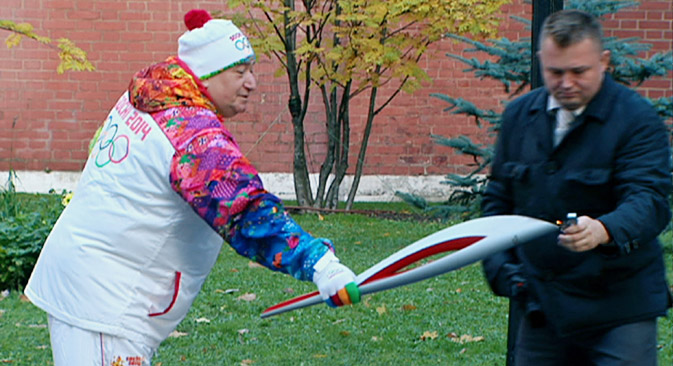
The moment of glory for Zippo. Source: AP
It took a few seconds for Shavarsh Karapetyan to realize that the Olympic torch he was carrying was suddenly flameless during his jog through the Kremlin, but when he did, he started gesticulating earnestly for help.
A nearby man in a dark suit obliged with something that looked suspiciously like a silver cigarette lighter, rather than the official Olympic lantern brought from Greece. It was an instantly forgettable video clip on news sites (and the basis for a cheeky, technically illegal social media campaign for Zippo lighters) but it pushed organizers into crisis mode.
First they refused to comment, then there was a brief claim that the lighter was actually a lantern, despite visual evidence to the contrary, and they finally settled on the line that whatever happened didn’t really matter anyway.
The relay of the Olympic flame in Moscow. Source: YouTube
More than anything, the confusion shows the tension Russia’s Olympic organizers are under - they’re in charge of not just the Sochi Games (a big enough task), but also of everything the event symbolizes – primarily, a resurgent Russia on the international stage.
On the whole, the torch relay has been a success so far, bringing crowds out onto the streets of Moscow in a way rarely seen for most cultural events.
The torchbearers have included many sports stars - legendary hockey goaltender Vladislav Tretiak and former figure skater Irina Slutskaya among them - as well as some ordinary people with remarkable stories.
The Zippo incident doesn’t even make top three notable events for torchbearer Karapetyan, a 17-time world record holder in underwater swimming who saved dozens of lives on two separate occasions.
There are a few gripes though - not everyone is happy about the preponderance of government officials and sponsors’ employees occupying the torchbearer schedule, and rumors persist of slots being offered for sale in some of Russia’s more remote regions.
As befits an Olympics aiming to promote Russia to the world, the relay takes in the country’s sheer size and incredibly diverse geography.
From the freezing forests of the Chukotka Peninsula through the near-desert steppe of mainly Buddhist Kalmykia to the valleys of the restive North Caucasus, the Olympic flame will visit all 83 regions of Russia.
One literal high point has already occurred, an unlit torch has been sent to the International Space Station, where it will be taken on a spacewalk, before being returned to Earth to light the cauldron at the Sochi opening ceremony on Feb. 7.
The Earthbound elements of the relay are a veritable bucket list for adventurous types - a camel trek, a trip up Russia’s highest mountain, the 15,554-foot Elbrus, a submarine venture through the depths of Lake Baikal.
Eventually, after a record 123 days and 65,000 kilometers traveled, the Olympic flame will end its journey from Ancient Olympia to a very modern Sochi.
Despite the various controversies surrounding Russia’s first Winter Olympics, they have already proved an undoubted success in one area: creating an incredibly motivated, welcoming and (usually) helpful volunteer army. Demand was so strong that organizers had to turn down 175,000 of the 200,000 who applied.
The torch relay’s national reach offers the perfect consolation for those inspired by the Games but stuck thousands of miles away. It’s one Olympic tradition perfectly suited to a country as vast as Russia, an opportunity for local pride and the chance to discover previously obscure facets of the host nation.
And a great ad for lighters.
All rights reserved by Rossiyskaya Gazeta.
Subscribe
to our newsletter!
Get the week's best stories straight to your inbox